‘Joker’ Is Too Complex For Pithy Titles So Just Read The Article (By Fallout Boy)
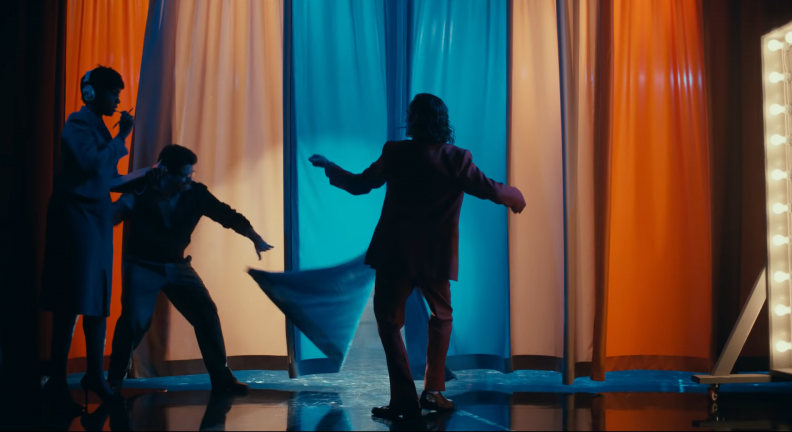 Joker is one of the most iconic characters in the entire DC universe. He’s also historically one of the most problematic. There’s a long history of people worshiping the Joker and excusing his actions, no matter what he does. When we heard Joker was coming out, it seemed like we were getting a fawning love letter to a character no one should ever idolize.
Joker is one of the most iconic characters in the entire DC universe. He’s also historically one of the most problematic. There’s a long history of people worshiping the Joker and excusing his actions, no matter what he does. When we heard Joker was coming out, it seemed like we were getting a fawning love letter to a character no one should ever idolize.
We didn’t get that. I think the wrong people will see it that way, but the film itself is painfully good.
Head’s up: I’m trying to avoid it, but there may be some incidental spoilers for Joker. Read at your own risk.
I almost walked out of Joker five minutes in.
I almost walked out again ten minutes later.
Honestly, if I weren’t reviewing this movie I would have walked out at several points during the first third (and maybe also during the second third). After seeing the grand finale I’m glad I didn’t… but maybe glad isn’t the right word? Joker was a powerful movie about a powerful and divisive character, and while I think it’s masterfully done I have some serious concerns.
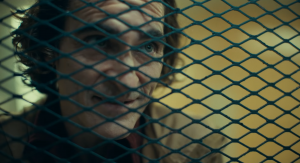
My concerns aren’t (as I expected) about the way Joker portrays mental illness. That canon character trait has been handled with varying degrees of empathy and skill by different writers with varying results. In Joker, every minute of Arthur’s life is marked by his struggle with an unnamed collection of mental illnesses. He can’t relate naturally to others. He takes seven medications, all prescribed by the state in what’s implied to be part of his release from a hospital. It’s rough. Several times he makes cutting observations about what it’s like to live with a mental illness. He pushes back against his cynical social worker who only talks at him, never listens.
Arthur does make a comment about being “off his meds” at one point, which I hate hearing from villains. It feels like a cheap shot. In fact, it’s one of the few cheap shots in a film where everything else costs you to watch. This is a demanding movie.
Moving on… I ultimately don’t have major issues with the Series Of Unfortunate Events that befalls Arthur. Seriously, he has been through it. Gotham is a wretched hive of scum and villainy in a way Mos Eisley wants to be when it grows up, and Arthur lives right in the worst of it.
These aren’t my biggest concerns because at the end of the day the Joker’s actions aren’t blamed on his mental illness or the bad hate Fate deals him. The movie flirts with that line and there is a LOT of gray area, but at the end of the day I feel Joker presents those points only to invalidate them. Arthur is the same person on or off his meds. He was already not great before most of the bad things happen. He doesn’t value or respect people in general, he makes others visibly uncomfortable, and even though he accuses his social worker of not listening to him he never truly listens himself. He performs his own reality without seeming to notice how people respond.
Arthur begins to choose how he handles what life throws at him based on what makes him happy. At his core, the Joker is a bad person and he’s only happy when he is living that truth.
You could possibly argue that he was pressured into the triggering event, though I’m countering that he had already made choices that put him in that position and was more than happy to go along with things. Plus, if you pay attention you see he’s already been given at least one second chance by society before the movie begins. (See how good I am at avoiding spoilers? You’re welcome.)
The Joker is not a tortured innocent. He is a bad person who does bad things for bad reasons. Core intent is and always has been the essential difference between Batman and the Joker. Both struggle with mental illness (Bruce Wayne dresses like a bat to fight crime you guys, he has issues, don’t @ me). However, Bruce is at heart a person who values life and seeks to protect it. The Joker just wants to dance in the ruins of the city.
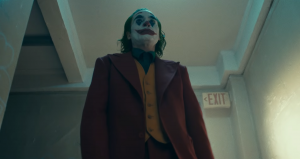
The depth of his core evil is very clear in this movie. When we ultimately watch Arthur’s transformation into the Joker it’s powerful, but frightening. We aren’t meant to celebrate with him. We’re meant to be uneasy and scared of how very possible it all seems- and that walks us up to my serious concern.
Those people who idolize the Joker? The ones who feel a kinship with him, who either don’t realize he’s the face of Chaotic Evil or haven’t played enough D&D to realize chaotic evil isn’t a playable alignment? They are going to LOVE this movie.
I said before that Joker is a demanding movie and it is. It starts with unbearable cringe and leaves you shaken. It’s so well done I am disturbed hours after watching. The creators challenge preconceptions about what makes people evil before slowly leading you to the conclusion that it comes down to free will. They choose to be evil. They revel in it, and when they have the Joker’s force of personality they inspire others to indulge their worst impulses.
I’m worried that’s going to happen here. Joker is a pretty clear indictment of the character, but the people who would be best advised to learn from this will instead see it as a benediction. Our own Bekah puts it best: “[The Joker is] their anthem, he’s their symbol. He’s their figurehead for all the misunderstood men who feel like they’ve been belittled and bullied. It’s ‘their time’ to ‘rise up’.”
These people are both pitiable and dangerous. In the movie, Arthur’s actions are twisted into a call to violence which is taken up all over the city, and that could happen here in the real world. It’s not an exaggeration. Threats from incel groups have been all over the news, to the point where the military warned soldiers to be careful on opening weekend.
Where does that leave us? I’m not sure. I won’t say I enjoyed Joker because it isn’t meant to be enjoyed. I do appreciate the artistry of it. Hats off to every single person involved, because it’s film making on an epic scale. People will be talking about this movie decades from now.
Still, I’m not sure the sheer quality outweighs the possible consequences. America- actually, the world- is in a bad way right now. We’re being led (if you can call it that) by the worst elements of society. Because Joker is so painfully well done, I can see people corrupting its message into a rallying cry.
So. You know. Proceed with caution?
Have you seen Joker yet? Share your thoughts in the comments!
Author: Khai
Khai is a writer, anthropologist, and games enthusiast. She is co-editor (alongside Alex DeCampi) of and contributor to “True War Stories”, a comic anthology published by Z2 Comics. When she’s not writing or creating games, Khai likes to run more tabletop RPGs than one person should reasonably juggle.
Help support independent journalism. Subscribe to our Patreon.
Copyright © The Geekiary
Do not copy our content in whole to other websites. If you are reading this anywhere besides TheGeekiary.com, it has been stolen.Read our

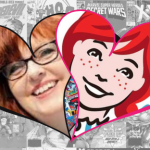
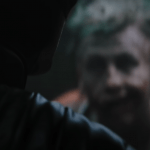

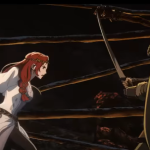


Long comment with spoilers:
I do think they’re asking you to side with a person that is impossible to side with, and the line between whose fault it ultimately is becomes blurry. My concern is that people, unhappy with the idea that something cannot be fully resolved, will instead choose one side or the other- as the reviewer did- and that many will side with Joker, because he is the anti-hero and he has all these odds stacked against him.
But we know what happens next. We know he chooses to continue on in his rampage, that he’s not seeking redemption or resolution, but instead to continue to inflict pain. The moment with the dwarf was intentional, he built that fear on purpose. He doesn’t feel remorse for his actions or seek justice. I sympathize for the raw hand he was dealt, for the abuse he suffered, for his problems, some of them systematic/institutional. But the abdication of personal responsibility until it serve his purposes hints that some of this is far more intentional. He is lucid enough to know what he has done and hasn’t- as he clearly knows that his “girlfriend” is a figment of his imagination when he goes into her apartment and scares (and I’m assuming killed) her.
The implied (actually, direct) indictment that society gets what it deserves when it doesn’t cater implicitly to the needs of a person is off-base. Especially when surrounding that (white, cis, male) person are tons of other marginalized people who are not responding in the same way.
I found the movie worth watching, the performances arresting, and felt a distinct unease and discomfort with the way the material was presented- as though it’s really not his fault, but rather all of our fault.
There are also a lot of unearned moments in the movie- in the beginning, he’s putting on the clown makeup and crying, but then when he loses his job we are meant to believe his protest that he loves being a clown?
After two days of very spirited debate with my partner about the incredibly well-done and problematic movie, I had a lightbulb moment last night.
The movie is chaotic, and shot from a single POV of a very unreliable narrator. We are, as it were, stuck in Arthur’s head. And we know that he doesn’t differentiate between illusion and reality- and while many of us already suspected before the reveal that his relationship with the woman down the hall was in his head, many likely took the explicit reveal as the only reveal of his delusions. Especially when he showed up on the Murray Franklin show and it was proven that the appearance and booking were real.
But what if he was never beaten by the kids or the wall streeters? What if the kids stole the sign, but he beat himself up? He doesn’t show a significant limp after the wall streeters beat him up- what if that part wasn’t even real? What if he imagined it, to give himself the kick he needed to set off his plan? The questionable nature of reality is explicit in the conflicting evidence of Arthur’s parentage. We leave the movie uncertain of whether Arthur is Arthur Wayne or Arthur Fleck, and the only people who could tell us the truth are, conveniently, dead, either killed by him or as a direct consequence of his actions.
The problem with an unreliable narrator and dead victims is that they cannot offer the objective reality that the encounter with the woman in her apartment forces the movie to give the audience.
Thus, the main drivers for any sympathetic connection to Arthur may just be in his head. We are never allowed to see the truth of his childhood trauma, and the abuse by strangers comes into sharp question as we begin to recognize that we can take nothing we’ve seen as objective reality.
Ironically, this may be Phillips’ point, however imperfectly made. If we believe that the Joker represents incels, then the slights that drive him (and them) to their violent acts may actually be all in their heads.